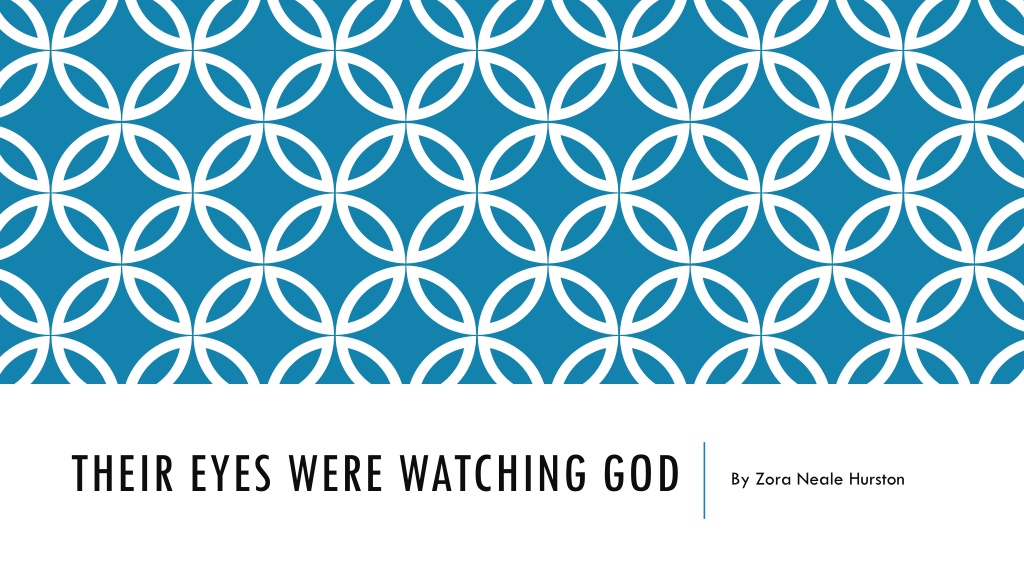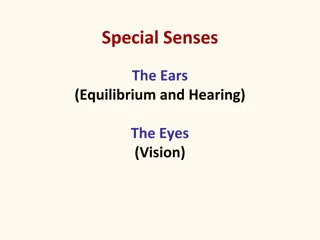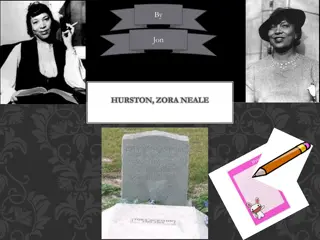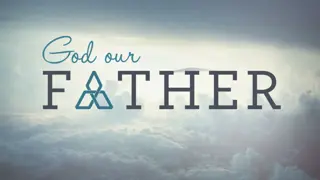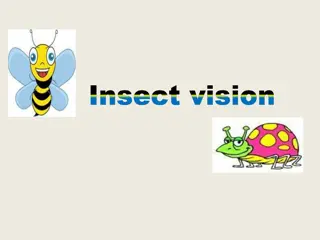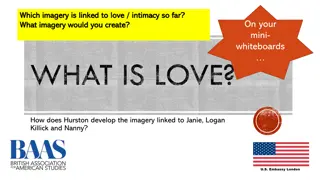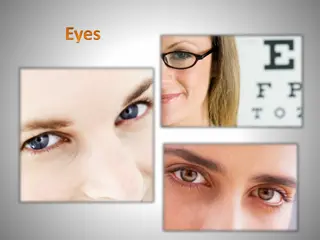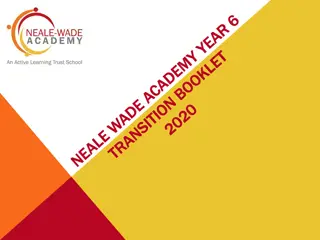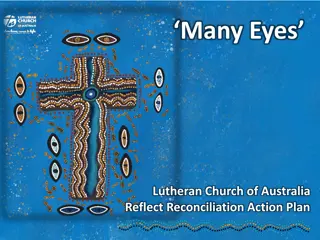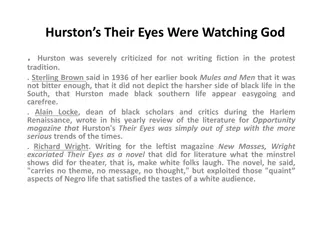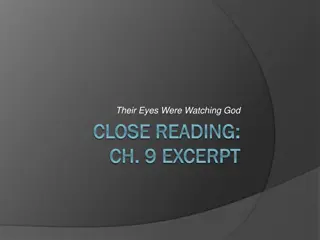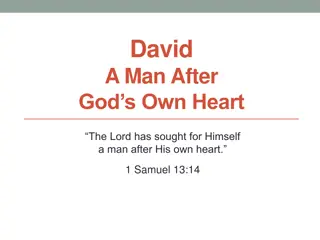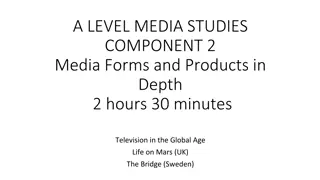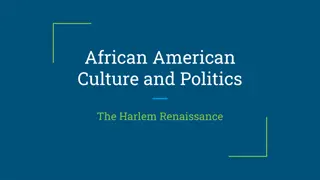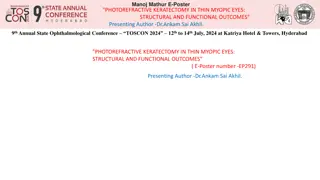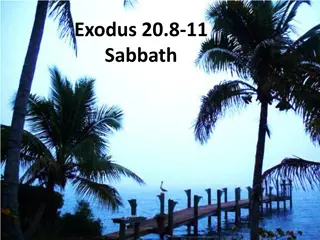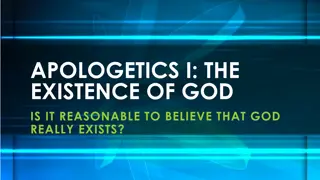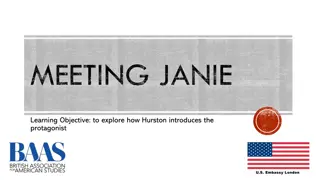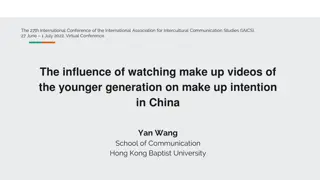Exploring Their Eyes Were Watching God by Zora Neale Hurston
Dive into the themes and characters of Zora Neale Hurston's novel, Their Eyes Were Watching God, through discussions on indirect characterization, author's purpose, and comparing film adaptations. Explore study questions, vocabulary, journal entries, and more to enhance your understanding of this literary classic.
Download Presentation

Please find below an Image/Link to download the presentation.
The content on the website is provided AS IS for your information and personal use only. It may not be sold, licensed, or shared on other websites without obtaining consent from the author. Download presentation by click this link. If you encounter any issues during the download, it is possible that the publisher has removed the file from their server.
E N D
Presentation Transcript
THEIR EYES WERE WATCHING GOD By Zora Neale Hurston
LEARNING TARGETS 1. Explore how writers use indirect characterization to develop well-rounded characters. 2. Infer an author s purpose, employing and citing textual evidence. 3. Compare a film interpretation to the written text it is based on.
ENTRY TASK Predict the meaning of the title Their Eyes Were Watching God. What do you think it might mean? What is the significance?
PARAGRAPHS 1 & 2 What distinction do the first two paragraphs make between men and women? What questions do these paragraphs raise for you?
VOCABULARY CH. 1 Resignation Judgment Brutes Relish Pugnacious Pelting consolation
JOURNAL ENTRY 5/2/16 Have you ever had anyone judge you? Talk about you behind your back? Talk poorly about you on social media? Write about a time when you ve experienced this. How did it feel? How did you respond?
THEIR EYES WERE WATCHING GOD - STUDY QUESTIONS In the UNIT 5 section of your notebook, write a brief answer to each study question as you read the novel. Use the questions for review before group discussions and before the test. Chapters 1-2 1. Interpret the meaning of the ships metaphor used in the first two paragraphs of Their Eyes Were Watching God. 2. How do the townspeople react to Janie s return to Eatonville? 3. What is Pheoby Watson s reaction to Janie s story? 4. Why does Janie tell her life story to Pheoby? 5. Why does Nanny raise Janie? 6. Janie doesn t realize she is black until age six. Describe Janie s environment and how she discovers her race. 7. What significance does the pear tree hold for Janie? How is it symbolic? 8. Identify the event that prompts Nanny to arrange for Janie s marriage to Logan Killicks. 9. Why does Nanny react so strongly to seeing Janie kiss Johnny Taylor? 10. Explain Nanny s views on romantic life. 11. How does Janie feel about marrying Logan Killicks?
CHAPTER 1 Based on the first chapter, What do you think some of the conflicts in the novel are going to be? What do you think the themes might be? The narrator states that the porch sitters sat in judgment. How might the porch be a metaphor? Cite evidence from the text to support your predictions.
CHARACTERIZATION Direct characterization tells the audience what the character is. Indirect characterizations shows things that reveal the personality of a character. One method of indirect characterization is what one character says about another. Other methods include the following: The character s appearance What the character says What the character thinks What the character does What other characters say about a character Which methods of characterization does Hurston use to establish Janie s character?
CH. 2 VOCABULARY Barren Revelation reproof Virginity languid dissolution Caressed confirmation diffused Consciousness elude affirmation Alto pollinated affirmation Inaudible persistent desecrating Sanctum lacerating desisted Calyxes overseer expound
CH. 3 VOCABULARY Cosmic Conjectures Mien Gulf
CHAPTER 3 QUESTIONS 1. What does Janie assume will happen once she marries Logan? Is she right? 2. Hurston writes She knew now that marriage did not make love at the end of Chapter 3. Explain the significance of this revelation to Janie.
CHAPTERS 4-5 VOCABULARY Portly hospitality promenading Incredulous saw-horses spittoon Surly brazen temerity Boisterously innovations Presiding cowed Percale literate Calico tangible Invested banisters
STUDY QUESTIONS CH. 4 1. How did Janie and Logan s relationship change? 2. What did Janie discover about love? 3. Describe Joe Starks. 4. What did Janie do shortly after she met Joe Starks?
ENTRY TASK On Friday you watched the movie version of Their Eyes Were Watching God through Chapter 4. What are some of the main differences between the movie and the book?
STUDY QUESTIONS CHAPTER 5 1. Who was Joe looking for when he and Janie got to town? 2. What actions did Joe take when he got to town? 3. How did Joe want Janie to look and act? 4. What was the result of Joes suggestion that the town incorporate and elect a mayor? 5. What was Janie s reaction when Joe said she couldn t make a speech? 6. Which of Joe s innovations was the first in a colored town? 7. How did Joe s position affect Janie s relationship with other town residents?
THEIR EYES WERE WATCHING GODFINAL PAPER PROMPT For your final essay, you will be writing about how Zora Neale Hurston s writings are both a reflection of and a departure from the Harlem Renaissance. Start listing down your ideas as to how Their Eyes Were Watching God could be a reflection of and a departure from the ideas of the Harlem Renaissance.
CH. 6 VOCABULARY Dolefully jostle beseeching Dilemma decorum submitted Figuratively sullen baiting Wallowing hyperbole proffered Braying grave Fractious bridled Carcass discomfiture Eulogy indignant Distended coquetry
CH. 6 STUDY QUESTIONS 1. What was the rock against which Janie was battered? 2. What did Joe do about the mule? 3. What happened to Joe and Janie s relationship during the seventh year of their marriage? 4. What was Janie s comment to the men during their conversation about Mrs. Tony? 5. Discuss the symbolism associated with the head rag Janie wears around the store. 6. Trace the origins and development of trouble in Janie and Joe s marriage.
WRITING PROMPTS RESPOND TO ONE OF THE PROMPTS BELOW IN YOUR JOURNAL (MIN. PAGE) The novel contains several scenes with men talking in an exaggerated and humorous way about women. Examine these scenes (pages 36; 67-69) and explain what they reveal about the cultural context of male and female roles. Consider Janie s description of the day she realized that she was not white (pages 8-9) and compare this description to Zora Neal Hurston s essay, How It Feels to be Colored Me. In both texts, the speaker s explanation of her awareness of race refers to more than an awareness of skin tone. What does Hurston mean when she writes about realizing she was colored ? What does Janie become aware of when she views the photo? How would you describe Hurston s view of racial identity? Their Eyes Were Watching God has been criticized for what some viewed as a negative and stereotypical portrayal of African Americans. Examine Hurston s choice to use vernacular English. Is there is any validity to criticisms of the novel s use of language?
ENTRY TASK (RESPOND IN UNIT 5 SECTION) 1. List as many differences between the book and movie as you can recall. 2. Also, Chapter 7 ends with Joe striking Janie. What are your predictions as to what Janie will do next? 3. Keep track of how this book both reflects and departs from the ideas of the Harlem Renaissance.
CHAPTERS 7-9 VOCABULARY Prostrating confidants usurper Stolidness ostentatiously refracted Pullet immensities Promontories counterpane Fractious pacify Commiserated strife Alliances insinuation Menial resurrection
CH. 7-9 STUDY QUESTIONS How does Janie cope with her unhappy life with Joe? Explain what motivates Joe for striking Janie? Detail the circumstances surrounding Joe s death. Discuss Janie s reaction to Joe s death. Contrast Janie s inward emotions with her outward appearances at Joe s funeral. What did Pheoby and the other townspeople think Janie should do now? Characterize Janie s feelings about finding a new mate after Joe s death. What did Janie say about mourning and grief?
Aspects of the Harlem Renaissance Examples from Chapters 7, 8, or 9 Is it a natural product of the ideas of a specific historical period in American literature? Is it a departure from the ideas of a specific historical period in American literature? Historical Context The conflict which Janie represents, between freedom or passion and restraint or reserve, has a special quality in black fiction The condition in slavery was the ultimate restriction in which freedom to be oneself is out of the question. from Their Eyes Were Watching God, by Roger Rosenblatt Philosophy/Beliefs Some believed that it was the duty of black artists to picture their race in the best possible light, thereby implying that only middle-class blacks were worthy of being depicted in art . [James Weldon] Johnson shows his acceptance of the lower social classes as a source for literary materials. from Zora Neale Hurston s America, by Theresa R. Love. The Arts Their Eyes Were Watching God, a novel of intense power, evidences the strength and power of African-American culture. Here characters were outsiders in America because they were the inheritors of a culture different from that of others. from The Outsider, by Addison Gayle, Jr. Daily Life In rebelling against the definition of black women and moving to assert her own individuality, Janie must travel the route of tradition. from The Outsider," by Addison Gayle, Jr.
Aspects of the Harlem Renaissance Examples from Chapters 7, 8, or 9 Is it a natural product of the ideas of a specific historical period in American literature? Hurston, in a critical manner, shows Joe as the slave master, ruling over his plantation. Is it a departure from the ideas of a specific historical period in American literature? Historical Context The conflict which Janie represents, between freedom or passion and restraint or reserve, has a special quality in black fiction The condition in slavery was the ultimate restriction in which freedom to be oneself is out of the question. from Their Eyes Were Watching God, by Roger Rosenblatt Philosophy/Beliefs Some believed that it was the duty of black artists to picture their race in the best possible light, thereby implying that only middle-class blacks were worthy of being depicted in art . [James Weldon] Johnson shows his acceptance of the lower social classes as a source for literary materials. from Zora Neale Hurston s America, by Theresa R. Love. The Arts Their Eyes Were Watching God, a novel of intense power, evidences the strength and power of African-American culture. Here characters were outsiders in America because they were the inheritors of a culture different from that of others. from The Outsider, by Addison Gayle, Jr. Daily Life In rebelling against the definition of black women and moving to assert her own individuality, Janie must travel the route of tradition. from The Outsider," by Addison Gayle, Jr. People who never had known what it was to enter the gate of the Mayor s yard unless it were to do some menial job now paraded in and out as his confidants. (p. 79) Uh woman by herself is uh pitiful thing. (p. 86) Reinforces Hurston s use of dialect to distinguish class. Rather than following the duty of black artists, Hurston chose to show acceptance of the lower social class. He had always been scornful of root- doctors and all their kind, but now she saw a faker from over around Altamonte Springs hanging around the place most daily. (p. 78) Hurston refers to the cultures of the islands voodoo and medicine men, emphasizing the African-American cultural heritage. However, the irony is that Joe, who has bought into the middle-class white man s world, has resorted to the medicine man for help. She got nothing from Jody except what money could buy, and she was giving away what she didn t value. (p. 72) She knew that she was a much better cook than the old woman, and cleaner about the kitchen. So she bought a beef- bone and made him some soup. (p. 78) Hurston portrays Janie as the traditional wife, accepting what she has, carrying out her duties as a wife. At this point, even after 20 years, she is traveling the route of tradition in her marriage.
CHAPTER 10 QUESTIONS Describe Tea Cake. How do he and Janie meet? What is Tea Cake s real name? Speculate about Tea Cake s choice of time to first visit Janie at her store. Why is the fact that Tea Cake asks Janie to play checkers significant to Janie? Janie frequently refers to Tea Cake as crazy. Interpret Janie s meaning.
READING GROUPS 3RD PERIOD 1. Erica, Michaela, Kira, Nick Y. 2. Dan, Trevor, Lilly, Jackson, Raquel 3. Kailey, Brock, Emily, Joey 4. Mikayla, Keanu, Caleb, Lucia 5. Erik, Justin, Connor, Joash 6. Elya, Karen, Jason, Tyler 7. Nick B., Evy, Tabitha, Callie
READING GROUPS 6TH PERIOD 1. Moses, Taylor A., Brandon, Seanna 2. Fernando, Matthew, Grace B., Ben 3. Jarrod, Lindsay, Matthew G., Savannah 4. Alex, Romualdo, Adam, Taylor S., Ian 5. Alexa, Nick, Jordan, Grace J., Albert 6. Leanna, Alyssa, Kyle, Isaac 7. Julie, Nathan, Collin, Bryan
READING/DISCUSSION GROUPS For Chapters 11-19, you will be reading on your own and participating in student-led discussion groups. Then, we will come back as a class to read Chapter 20 and finish the book together. For each chapter from 11-19, you will write literal, interpretive, and universal questions to help guide your group discussions. It is imperative that each member of the group be present in class daily and maintain the reading schedule in order for discussions to be effective. To guide your discussion group s reading, consider these aspects of the Harlem Renaissance to trace throughout the novel: Historical context Philosophy/beliefs The arts Daily life
AS YOU DISCOVER TEXTUAL EVIDENCE THAT CONNECTS TO EACH OF THESE ASPECTS, WRITE YOUR LEVELS OF QUESTIONS. BE PREPARED TO DISCUSS THESE POINTS BY IDENTIFYING HOW THE TEXT ILLUSTRATES HURSTON S REFLECTIONS OF THE HARLEM RENAISSANCE AND HER DEPARTURES FROM ITS COMMON THEMES. Today s date: Chapter: Pages: LITERAL QUESTIONS INTERPRETIVE QUESTIONS UNIVERSAL QUESTIONS
WHAT YOURE EXPECTED TO DO: 1. Read one chapter together as a group at a time. Take turns reading. The dialect is hard at first, but it gets easier. Have fun with it! 2. Write 3 questions (literal, interpretive, universal) individually after every chapter. 3. Have a group discussion based on the questions you wrote. 4. Take notes on the discussion. 5. Write a brief summary/reflection of your group s discussion (5-10 sentences)
LITERAL, INTERPRETIVE, AND UNIVERSAL QUESTIONS Level One Questions: Literal factual--can be answered definitely with facts address key elements of the text answers found directly in the text or by information readily available in outside sources have one correct answer require reading of the work, but require little thought or understanding good answers lead to an accurate and complete summary of the text Example: Name the feuding families in Romeo and Juliet? Example: What is an apothecary?
INTERPRETIVE QUESTIONS Level Two Questions: Interpretive inferential--answers to these questions may be implied rather than stated directly in the reading address motive of author or a character reader must make inferences based on specific information they can cite to back up their conclusions found by following patterns and seeing relationships among parts of the text call for longer answers and more thinking require reading of the work AND consideration of what has been read good answers lead to an identification of the significant patterns Example: What is Romeo s concept of love at the start of the play? Example: Is Friar Lawrence or the Nurse more to blame for the tragedy?
UNIVERSAL QUESTIONS Level Three Questions: Global or universal Connecting answers to these questions emphasize the So what? of the text link text to prior knowledge, other texts, or human experiences in life found by testing the ideas of a text against readers schema require the reader to think more abstractly and relate the text to real life good answers lead to an appreciation of the text and further discussion
YOUR TASK TODAY: Make sure you have questions and summaries done for Chapters 13. Read Chapter 14 in your groups and write your 3 questions, then discuss as a group and write your summary. QUIZ TOMORROW!
CHAPTER QUESTION AND SUMMARIES Your task today: 1. Finish the book! 2. Write 3 questions (literal, interpretive, universal) for Chapter 19 AND Chapter 20 3. Discuss both chapters and the ending of the book. 4. Write summaries for Chapter 19 and Chapter 20 QUESTIONS & SUMMARIES DUE MONDAY!! MAKE SURE YOU VE COMPLETED ALL OF THEM.
ANALYTICAL ESSAY PROMPT: Write an analytical essay in which you discuss how Zora Neale Hurston s writing is both a reflection of and a departure from the ideas of the Harlem Renaissance. Include aspects of the Harlem Renaissance that you see reflected in Hurston s writing as well as characteristics of Hurston s writing that are departures from selected aspects of the Harlem Renaissance.
PLANNING AND PREWRITING Questions to consider: What resources on the Harlem Renaissance can you use to help you plan your work? What writings by Zora Neale Hurston will you refer to? What elements of the Harlem Renaissance do you recognize in Hurston s writing, and what elements of her writings seem to be departures from those aspects?
DRAFTING Determine the structure and how you will incorporate your evidence How can you state your claim as a single thesis statement so that it captures your thinking? What organizational pattern will best allow you to compare Hurston s work to aspects of the Harlem Renaissance? How will you use textual evidence from your sources to support your ideas? How will you use commentary to explain how this evidence relates to your thesis? Is the evidence that you use cited in a way that will allow your audience to know which source is being used every time? Does your Works Cited page provide all the information necessary for your audience?
ESSAY OUTLINE I. Introduction, thesis statement (last sentence of introduction) II. Body Paragraph 1: Topic Sentence, Evidence, Commentary (Example 1) III. Body Paragraph 2: Topic Sentence, Evidence, Commentary (Example 2) IV. Body Paragraph 3: Topic Sentence, Evidence, Commentary (Example 3) V. Conclusion: Briefly summarize your main points, restate thesis if necessary, and leave reader with something to think about. What did the reader learn from this essay and what should they do with it now?
